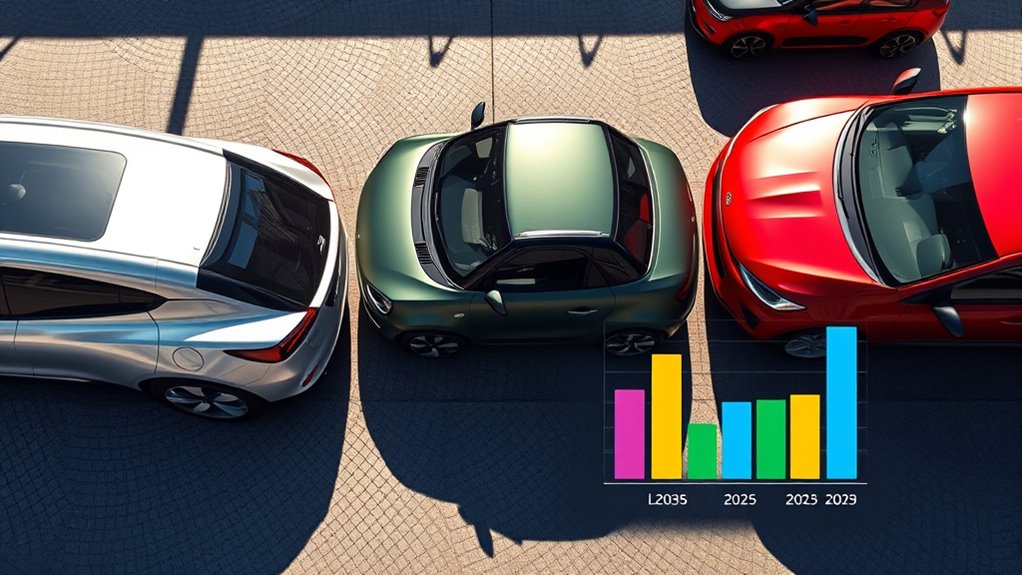In 2025, leasing an electric vehicle generally costs more upfront but offers lower ongoing expenses thanks to cheaper fuel and maintenance, plus incentives. Hybrids balance savings with less reliance on charging stations, making them a middle ground. Gas vehicles tend to have lower initial payments but higher fuel and maintenance costs over time. As infrastructure and technology improve, you’ll find lease options becoming more attractive across all three. Keep exploring to uncover more details.
Key Takeaways
- EV leasing costs are expected to decrease with expanding charging infrastructure and technological advancements by 2025.
- Hybrids may offer a balanced lease cost due to lower fuel expenses and moderate maintenance.
- Gas vehicle leases might be initially cheaper but incur higher long-term fuel and maintenance expenses.
- Incentives and rebates for EVs and hybrids can significantly reduce lease costs in 2025.
- Future infrastructure growth and innovations will make EV and hybrid leasing more cost-effective than traditional gas vehicles.

As we approach 2025, understanding the costs associated with electric, hybrid, and gas vehicle leases becomes essential for making informed decisions. One of the critical factors to weigh is the charging infrastructure. Electric vehicles (EVs) rely heavily on accessible charging stations, which can vary considerably depending on where you live or work. If charging stations are plentiful and reliable, leasing an EV might be more convenient and economical. However, in areas with limited charging options, you might face added costs or inconvenience, potentially increasing your overall expenses. Hybrid vehicles, combining an internal combustion engine with an electric motor, offer more flexibility, often requiring less frequent charging and benefiting from existing fueling infrastructure. Gas vehicles, meanwhile, depend entirely on traditional fueling stations, which are widespread and well-established across most regions. Understanding the availability and cost of charging infrastructure influences not only your convenience but also your total lease costs over time.
Charging infrastructure availability impacts EV lease costs and convenience, influencing your overall expenses and driving experience.
The environmental impact of these vehicles is another critical consideration. Electric vehicles produce zero tailpipe emissions, making them a cleaner choice for the environment. By leasing an EV, you reduce your carbon footprint, especially if the electricity used for charging comes from renewable sources. While EVs may have higher upfront lease costs, they often benefit from incentives, tax credits, and lower operating expenses, which can offset initial investments. Hybrid vehicles emit fewer pollutants than purely gas-powered cars but still produce some emissions, and they help reduce overall pollution levels while providing greater flexibility in charging and fueling. Gas vehicles, on the other hand, tend to have higher emissions and contribute more considerably to pollution and climate change. Over the lease term, the environmental impact can influence not just your personal carbon footprint but also broader community health and sustainability efforts.
Cost considerations extend beyond initial lease payments to include maintenance, fuel or electricity costs, and potential incentives. EVs usually have lower maintenance costs because they have fewer moving parts, and electricity is generally cheaper than gasoline. Hybrids strike a balance, with reduced fuel costs and moderate maintenance expenses. Gas vehicles might have lower initial lease payments but often incur higher fuel and maintenance costs over time. When factoring in environmental impact, leasing an EV might align better with personal or corporate sustainability goals, potentially offering benefits like tax incentives or rebates. Additionally, ongoing advancements in creative thinking and problem-solving are fostering innovative ways to optimize vehicle efficiency and reduce costs.
Ultimately, your choice depends on your driving habits, local infrastructure, budget, and environmental values. As infrastructure expands and technology advances, the costs and convenience of leasing electric and hybrid vehicles are likely to improve, making them increasingly attractive options for 2025 and beyond.
Frequently Asked Questions
How Do Lease Terms Vary by Vehicle Type?
When considering lease terms, vehicle type makes a difference. Electric cars often have shorter lease durations due to battery longevity concerns, and you might face higher costs if the charging infrastructure isn’t widespread. Hybrids usually offer more flexible lease options, while gas vehicles tend to have longer, more straightforward terms. Your choice depends on how battery longevity and charging options fit into your needs, influencing lease length and costs.
Are There Tax Incentives Affecting Lease Costs?
Tax incentives can substantially impact your lease costs by reducing the overall expense. You should check tax credit implications and incentive eligibility for electric and hybrid vehicles, as these often qualify for federal or state incentives. Being aware of these factors helps you make smarter leasing decisions, potentially lowering monthly payments and total costs. Always verify current incentives before leasing to maximize your savings and ensure you’re eligible for the benefits.
What Are the Maintenance Differences Among These Vehicles?
Imagine saving hundreds on maintenance annually—electric vehicles typically need less upkeep. You’ll find fewer moving parts, reducing repair costs. Hybrids require less engine maintenance than gas cars but still need oil changes. Gas vehicles need regular oil, filter changes, and more frequent brake repairs. With growing charging infrastructure, electric vehicles become easier to maintain, and their battery longevity means fewer replacements, making your long-term costs markedly lower than traditional gas options.
How Does Residual Value Impact Lease Payments?
Residual value directly impacts your lease payments because it estimates how much the vehicle will be worth at lease end. If the residual value is high, your monthly payments decrease since the car retains more value, reducing depreciation costs. Factors like battery degradation in electric and hybrid vehicles influence residual value estimation, making it vital for lease providers to accurately predict future worth. This guarantees fair lease terms for you.
What Are the Insurance Cost Differences for Each Vehicle?
Did you know that insurance premiums for electric vehicles can be up to 20% higher than gas cars? Coverage differences account for this, as electric cars often have specialized parts and higher repair costs. Hybrid vehicles tend to fall in between. Your insurance costs vary based on vehicle type, driving history, and coverage options, so it’s smart to compare quotes to find the best deal for each.
Conclusion
As you weigh your options for 2025, remember that each vehicle type offers unique benefits and costs. Will you prioritize lower monthly payments with a hybrid, or embrace the eco-friendly appeal of an electric? Gas cars still hold appeal for their familiarity and fueling convenience. Ultimately, your choice depends on your budget, values, and driving needs. Isn’t it time you considered which lease aligns best with your lifestyle and future plans?










